Sonnet18(英文赏析)
sonnet18—byWilliamShakespeare赏析
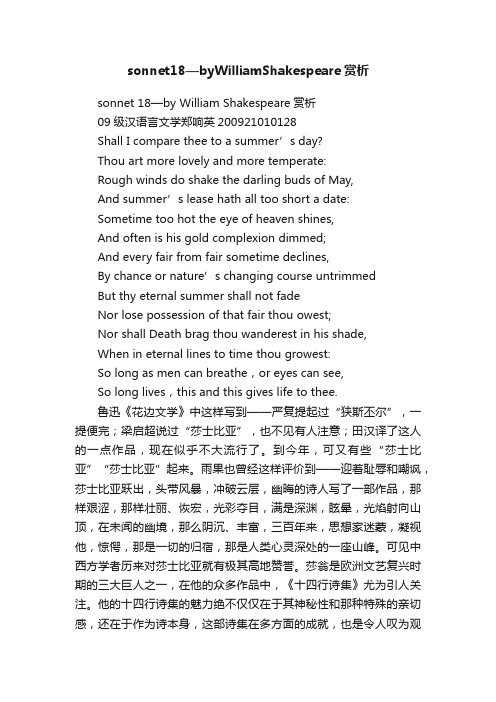
sonnet18—byWilliamShakespeare赏析sonnet 18—by William Shakespeare赏析09级汉语言文学郑响英200921010128Shall I compare thee to a summer’s day?Thou art more lovely and more temperate:Rough winds do shake the darling buds of May,And summer’s lease hath all too short a date:Sometime too hot the eye of heaven shines,And often is his gold complexion dimmed;And every fair from fair sometime declines,By chance or nature’s changing course untrimmedBut thy eternal summer shall not fadeNor lose possession of that fair thou owest;Nor shall Death brag thou wanderest in his shade,When in eternal lines to time thou growest:So long as men can breathe,or eyes can see,So long lives,this and this gives life to thee.鲁迅《花边文学》中这样写到——严复提起过“狭斯丕尔”,一提便完;梁启超说过“莎士比亚”,也不见有人注意;田汉译了这人的一点作品,现在似乎不大流行了。
到今年,可又有些“莎士比亚”“莎士比亚”起来。
雨果也曾经这样评价到——迎着耻辱和嘲讽,莎士比亚跃出,头带风暴,冲破云层,幽晦的诗人写了一部作品,那样艰涩,那样壮丽、恢宏,光彩夺目,满是深渊,眩晕,光焰射向山顶,在未闻的幽境,那么阴沉、丰富,三百年来,思想家迷蒙,凝视他,惊愕,那是一切的归宿,那是人类心灵深处的一座山峰。
莎士比亚十四行诗第十八首的英文评论和赏析

莎士比亚十四行诗第十八首的英文评论和赏析◎ 莎士比亚十四行诗第18首◇ 曹明伦译18 18我是否可以把你比喻成夏天?Shall I compare thee to a summer's day?虽然你比夏天更可爱更温和: Thou art more lovely and more temperate:狂风会使五月娇蕾红消香断,Rough winds do shake the darling buds of May,夏天拥有的时日也转瞬即过; And summer's lease hath all too short a date:有时天空之巨眼目光太炽热,Sometime too hot the eye of heaven shines,它金灿灿的面色也常被遮暗; And often is his gold complexion dimmed,而千芳万艳都终将凋零飘落,And every fair from fair sometime declines,被时运天道之更替剥尽红颜; By chance, or nature's changing course untrimmed:但你永恒的夏天将没有止尽, But thy eternal summer shall not fade,你所拥有的美貌也不会消失, Nor lose possession of that fair thou ow'st,死神终难夸口你游荡于死荫,Nor shall death brag thou wander'st in his shade,当你在不朽的诗中永葆盛时;When in eternal lines to time thou grow'st,只要有人类生存,或人有眼睛,So long as men can breathe, or eyes can see,我的诗就会流传并赋予你生命。
莎士比亚-sonnet-18-29-66的中文翻译及评析

18莎士比亚的十四行诗总体上表现了一个思想:爱征服一切。
他的诗充分肯定了人的价值、赞颂了人的尊严、个人的理性作用。
诗人将抽象的概念转化成具体的形象,用可感可见的物质世界,形象生动地阐释了人文主义的命题。
诗的开头将“你”和夏天相比较。
自然界的夏天正处在绿的世界中,万物繁茂地生长着,繁阴遮地,是自然界的生命最昌盛的时刻。
那醉人的绿与鲜艳的花一道,将夏天打扮得五彩缤纷、艳丽动人。
但是,“你”却比夏天可爱多了,比夏天还要温婉。
五月的狂风会作践那可爱的景色,夏天的期限太短,阳光酷热地照射在繁阴班驳的大地上,那熠熠生辉的美丽不免要在时间的流动中凋残。
这自然界最美的季节和“你”相比也要逊色不少。
而“你”能克服这些自然界的不足。
“你”在最灿烂的季节不会凋谢,甚至“你”美的任何东西都不会有所损失。
“你”是人世的永恒,“你”会让死神的黑影在遥远的地方停留,任由死神的夸口也不会死去。
“你”是什么?“你”与人类同在,你在时间的长河里不朽。
那人类精神的精华——诗,是你的形体吗?或者,你就是诗的精神,就是人类的灵魂。
诗歌在形式上一改传统的意大利十四行诗四四三三体,而是采用了四四四二体:在前面充分地发挥表达的层次,在充分的铺垫之后,用两句诗结束全诗,点明主题。
全诗用新颖巧妙的比喻,华美而恰当的修饰使人物形象鲜明、生气鲜活。
诗人用形象的表达使严谨的逻辑推理变得生动有趣、曲折跌宕,最终巧妙地得出了人文主义的结论。
二十九首就是其中的一首。
这首诗热情地歌颂爱情,诗人在创作这首诗时,充分发挥了十四行诗的长处,采用了“先抑后扬”手法,层层推进,波澜起伏,道出了诗人的思想感情发展变化过程,开头四句这样写道:When ,in disgrace with Fortune and men’ eyes ,sI all alone beweep my outcast state ,And trouble deaf heaven with my bootless cries ,And look upon myself ,and curse my fate ,从这四句我们可以读出,一开始诗人悲悲切切地唱出自己的悲惨处境“in disgrace with Fortune and,men’ eyes (失去了幸福,又遭人白眼。
sonnet18 的英文赏析(部分)
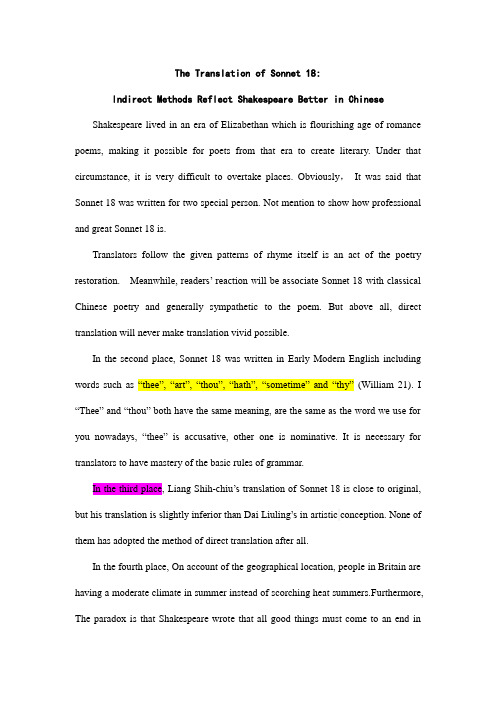
The Translation of Sonnet 18:Indirect Methods Reflect Shakespeare Better in Chinese Shakespeare lived in an era of Elizabethan which is flourishing age of romance poems, making it possible for poets from that era to create literary. Under that circumstance, it is very difficult to overtake places. Obviously,It was said that Sonnet 18 was written for two special person. Not mention to show how professional and great Sonnet 18 is.Translators follow the given patterns of rhyme itself is an act of the poetry restoration. Meanwhile, readers’ reaction will be associate Sonnet 18 with classical Chinese poetry and generally sympathetic to the poem. But above all, direct translation will never make translation vivid possible.In the second place, Sonnet 18 was written in Early Modern English including words such as “thee”, “art”, “thou”, “hath”, “sometime” and “thy”(William 21). I “Thee” and “thou” both have the same meaning, are the same as the word we use for you nowadays, “thee” is accusative, other one is nominative. It is necessary for translators to have mastery of the basic rules of grammar.In the third place, Liang Shih-chiu’s translation of Sonnet 18 is close to original, but his translation is slightly inferior than Dai Liuling’s in artistic conception. None of them has adopted the method of direct translation after all.In the fourth place, On account of the geographical location, people in Britain are having a moderate climate in summer instead of scorching heat summers.Furthermore, The paradox is that Shakespeare wrote that all good things must come to an end inline 7, line 8 is actually doing matting to the next lines,.In the eyes of Shakespeare, there is no doubt that “thou” will s pread through the ages just like what he wrote in his las t two lines are expressed by “men can breathe”, “eyes can see” (William 21).In the fifth place, Sonnet 18 is not perfect despite its classic, indirect translation is a vital part during propagation. Most of the college student s don’t appreciate Sonnet 18 based on teaching investigation. It is normal that classical poetry are n’t popular, but it is vain to ascribe this phenomenon to readers or the society. Few people can look again for the classical poetry. However, flaws in text itself maybe the reason why they are unpopular. On the one hand, although Sonnet 18 consists of three quatrains and a couplet, the rhyme isn’t neat. The stress placement of the end rhyme are difference, despite “temperate” in line 2 and “date” in line 4 are end with “ate”. Compared with the other lines, this rhyme is abrupt. The two “ands” in the beginning of line 6 and line 7 should function as a progressive alliteration rather than a parallel one. Meter, rhyme and stanza, in the right hands, can be inescapably precise as to tone, rhythm, emphasis and the stages of the argument. Shakespeare was overdoing it in Sonnet 18, it’s disrupted the form of Sonnet 18 and fragmented the melody and rhythm. All these factors had negative impact on Sonnet 18. Actually, the readers foun d that difficult to read bumpy sentences. On the other hand, “And every fair from fair sometime declines”(William 21) was written in obscure way that readers may feel abstract. “Summer” has a lease but the lease is short, from “And summer’s lease hath all too short a date” (William 21) in line 4. The sheer aesthetics that Shakespeare goes for in some ways readers may feel strange. There were anthropomorphic, forexample, “death” doesn’t exist, not to mention that it could brag, but this descriptive method is commonplace for such a classical poem. It is a truth acknowledged by anyone that life is short and time is swift, simple truth are told in the presentation of complex information, readers may not feel cordiality and geniality. Indirect translation can put original version into a band new one, to avoid this situation and make the work get better and better, especially be particularly important for readers under this circumstances. Direct translation will never make that happen and only make matters worse.When I learnt an ancient poem as a pupil, I wasn’t learning at the right level, I just learnt the words, not the message, then I asked my teacher for help. My teacher Would told me about the profound intent. When I read a poem, especially the translatio n, it’s not just about the literal meaning, I want to know the inner meaning of it, including its cultural background, historical origin and so on. After reading, I must learn some new knowledge, that’s the meaning of reading. Indirect translation is like my teacher, making my read smoothly and understandingly.Sonnet 18 is one of the most beautiful sonnets written by Shakespeare. In this sonnet, the poet writes beautifully on the conventional theme that his poetry will bring eternity to the one he loves a nd eulogizes. However, it’s more than that.Conceptual Blending Theory is used in this paper to analyze why literal translation and liberal translation arise in translation. It points out that, when translating the rhetorical devices in English titles, both translational equivalence and functional equivalence can be taken as the criteria.。
莎士比亚 sonnet 18 29 66的中文翻译及评析

18莎士比亚的十四行诗总体上表现了一个思想:爱征服一切。
他的诗充分肯定了人的价值、赞颂了人的尊严、个人的理性作用。
诗人将抽象的概念转化成具体的形象,用可感可见的物质世界,形象生动地阐释了人文主义的命题。
诗的开头将“你”和夏天相比较。
自然界的夏天正处在绿的世界中,万物繁茂地生长着,繁阴遮地,是自然界的生命最昌盛的时刻。
那醉人的绿与鲜艳的花一道,将夏天打扮得五彩缤纷、艳丽动人。
但是,“你”却比夏天可爱多了,比夏天还要温婉。
五月的狂风会作践那可爱的景色,夏天的期限太短,阳光酷热地照射在繁阴班驳的大地上,那熠熠生辉的美丽不免要在时间的流动中凋残。
这自然界最美的季节和“你”相比也要逊色不少。
而“你”能克服这些自然界的不足。
“你”在最灿烂的季节不会凋谢,甚至“你”美的任何东西都不会有所损失。
“你”是人世的永恒,“你”会让死神的黑影在遥远的地方停留,任由死神的夸口也不会死去。
“你”是什么?“你”与人类同在,你在时间的长河里不朽。
那人类精神的精华——诗,是你的形体吗?或者,你就是诗的精神,就是人类的灵魂。
诗歌在形式上一改传统的意大利十四行诗四四三三体,而是采用了四四四二体:在前面充分地发挥表达的层次,在充分的铺垫之后,用两句诗结束全诗,点明主题。
全诗用新颖巧妙的比喻,华美而恰当的修饰使人物形象鲜明、生气鲜活。
诗人用形象的表达使严谨的逻辑推理变得生动有趣、曲折跌宕,最终巧妙地得出了人文主义的结论。
二十九首就是其中的一首。
这首诗热情地歌颂爱情,诗人在创作这首诗时,充分发挥了十四行诗的长处,采用了“先抑后扬”手法,层层推进,波澜起伏,道出了诗人的思想感情发展变化过程,开头四句这样写道:When ,in disgrace with Fortune and men’ eyes ,sI all alone beweep my outcast state ,And trouble deaf heaven with my bootless cries ,And look upon myself ,and curse my fate ,从这四句我们可以读出,一开始诗人悲悲切切地唱出自己的悲惨处境“in disgrace with Fortune and,men’ eyes (失去了幸福,又遭人白眼。
Sonnet 18(英文赏析)
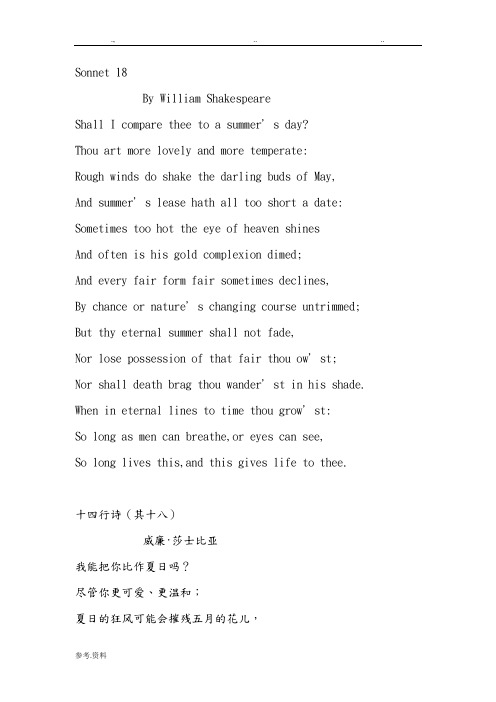
Sonnet 18By William ShakespeareShall I compare thee to a summer’s day?Thou art more lovely and more temperate:Rough winds do shake the darling buds of May, And summer’s lease hath all too short a date: Sometimes too hot the eye of heaven shinesAnd often is his gold complexion dimed;And every fair form fair sometimes declines,By chance or nature’s changing course untrimmed; But thy eternal summer shall not fade,Nor lose possession of that fair thou ow’st;Nor shall death brag thou wander’st in his shade. When in eternal lines to time thou grow’st:So long as men can breathe,or eyes can see,So long lives this,and this gives life to thee.十四行诗(其十八)威廉·莎士比亚我能把你比作夏日吗?尽管你更可爱、更温和;夏日的狂风可能会摧残五月的花儿,季节的限制又减少了可拥有的日光;天空的巨眼有时过于灼热,常使自身的辉煌无故湮没;每一种美都会消逝,不管愿意或是无奈;然而你这盛夏将永存不朽,连你所有的美都不会褪去;死神不忍逼近,生命只会长存;只要人类能呼吸,能看见;我的诗就会存在,而你的生命也会延续。
赏析威廉莎士比亚的十四行诗
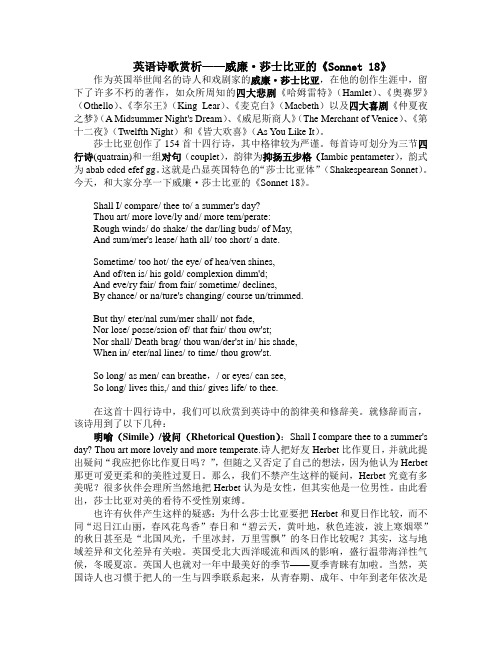
英语诗歌赏析——威廉·莎士比亚的《Sonnet 18》作为英国举世闻名的诗人和戏剧家的威廉·莎士比亚,在他的创作生涯中,留下了许多不朽的著作,如众所周知的四大悲剧《哈姆雷特》(Hamlet)、《奥赛罗》(Othello)、《李尔王》(King Lear)、《麦克白》(Macbeth)以及四大喜剧《仲夏夜之梦》(A Midsummer Night's Dream)、《威尼斯商人》(The Merchant of Venice)、《第十二夜》(Twelfth Night)和《皆大欢喜》(As You Like It)。
莎士比亚创作了154首十四行诗,其中格律较为严谨。
每首诗可划分为三节四行诗(quatrain)和一组对句(couplet),韵律为抑扬五步格(Iambic pentameter),韵式为abab cdcd efef gg。
这就是凸显英国特色的“莎士比亚体”(Shakespearean Sonnet)。
今天,和大家分享一下威廉·莎士比亚的《Sonnet 18》。
Shall I/ compare/ thee to/ a summer's day?Thou art/ more love/ly and/ more tem/perate:Rough winds/ do shake/ the dar/ling buds/ of May,And sum/mer's lease/ hath all/ too short/ a date.Sometime/ too hot/ the eye/ of hea/ven shines,And of/ten is/ his gold/ complexion dimm'd;And eve/ry fair/ from fair/ sometime/ declines,By chance/ or na/ture's changing/ course un/trimmed.But thy/ eter/nal sum/mer shall/ not fade,Nor lose/ posse/ssion of/ that fair/ thou ow'st;Nor shall/ Death brag/ thou wan/der'st in/ his shade,When in/ eter/nal lines/ to time/ thou grow'st.So long/ as men/ can breathe,/ or eyes/ can see,So long/ lives this,/ and this/ gives life/ to thee.在这首十四行诗中,我们可以欣赏到英诗中的韵律美和修辞美。
Sonnet_18(英文赏析)

Sonnet 18By William ShakespeareShall I compare thee to a summer’s day?Thou art more lovely and more temperate: Rough winds do shake the darling buds of May, And summer’s lease hath all too short a date: Sometimes too hot the eye of heaven shinesAnd often is his gold complexion dimed;And every fair form fair sometimes declines,By chance or nature’s changing course untrimmed; But thy eternal summer shall not fade,Nor lose possession of that fair thou ow’st;Nor shall death brag thou wander’st in his shade. When in eternal lines to time thou grow’st:So long as men can breathe,or eyes can see,So long lives this,and this gives life to thee.十四行诗(其十八)威廉·莎士比亚我能把你比作夏日吗?尽管你更可爱、更温和;夏日的狂风可能会摧残五月的花儿,季节的限制又减少了可拥有的日光;天空的巨眼有时过于灼热,常使自身的辉煌无故湮没;每一种美都会消逝,不管愿意或是无奈;然而你这盛夏将永存不朽,连你所有的美都不会褪去;死神不忍逼近,生命只会长存;只要人类能呼吸,能看见;我的诗就会存在,而你的生命也会延续。
莎士比亚 sonnet 18 29 66的中文翻译及评析

18莎士比亚的十四行诗总体上表现了一个思想:爱征服一切。
他的诗充分肯定了人的价值、赞颂了人的尊严、个人的理性作用。
诗人将抽象的概念转化成具体的形象,用可感可见的物质世界,形象生动地阐释了人文主义的命题。
诗的开头将“你”和夏天相比较。
自然界的夏天正处在绿的世界中,万物繁茂地生长着,繁阴遮地,是自然界的生命最昌盛的时刻。
那醉人的绿与鲜艳的花一道,将夏天打扮得五彩缤纷、艳丽动人。
但是,“你”却比夏天可爱多了,比夏天还要温婉。
五月的狂风会作践那可爱的景色,夏天的期限太短,阳光酷热地照射在繁阴班驳的大地上,那熠熠生辉的美丽不免要在时间的流动中凋残。
这自然界最美的季节和“你”相比也要逊色不少。
而“你”能克服这些自然界的不足。
“你”在最灿烂的季节不会凋谢,甚至“你”美的任何东西都不会有所损失。
“你”是人世的永恒,“你”会让死神的黑影在遥远的地方停留,任由死神的夸口也不会死去。
“你”是什么?“你”与人类同在,你在时间的长河里不朽。
那人类精神的精华——诗,是你的形体吗?或者,你就是诗的精神,就是人类的灵魂。
诗歌在形式上一改传统的意大利十四行诗四四三三体,而是采用了四四四二体:在前面充分地发挥表达的层次,在充分的铺垫之后,用两句诗结束全诗,点明主题。
全诗用新颖巧妙的比喻,华美而恰当的修饰使人物形象鲜明、生气鲜活。
诗人用形象的表达使严谨的逻辑推理变得生动有趣、曲折跌宕,最终巧妙地得出了人文主义的结论。
二十九首就是其中的一首。
这首诗热情地歌颂爱情,诗人在创作这首诗时,充分发挥了十四行诗的长处,采用了“先抑后扬”手法,层层推进,波澜起伏,道出了诗人的思想感情发展变化过程,开头四句这样写道:When ,in disgrace with Fortune and men’ eyes ,sI all alone beweep my outcast state ,And trouble deaf heaven with my bootless cries ,And look upon myself ,and curse my fate ,从这四句我们可以读出,一开始诗人悲悲切切地唱出自己的悲惨处境“in disgrace with Fortune and,men’ eyes (失去了幸福,又遭人白眼。
sonnet 18 莎士比亚的作品《第十八行诗》赏析 英文版教学文稿

s o n n e t18莎士比亚的作品《第十八行诗》赏析英文版The speaker of the poem opens with a question that is addressed to the beloved, "Shall I compare thee to a summer's day?" This question is comparing her to the summer time of the year. It is during this time when the flowers are blooming, trees are full of leaves, the weather is warm, and it is generally thought of as an enjoyable time during the year. The following eleven lines in the poem are also dedicated to similar comparisons between the beloved and summer days. In lines 2 and 3, the speaker explains what mainly separates the young woman from the summer's day: she is "more lovely and more temperate." (Line 2) Summer's days tend toward extremes: they are sometimes shaken by "rough winds" (line3) which happens and is not always as welcoming as the woman. However in line 4, the speaker gives the feeling again that the summer months are often to short by saying, "And summer抯 lease hath tooshort a date." In the summer days, the sun, "the eye of heaven" (line 5), often shines "too hot," or too dim, "his gold complexion dimmed" (line 6), that is there are many hot days during the summer but soon the sun begins to set earlier at night because autumn is approaching. Summer is moving along too quickly for the speaker, its time here needs to be longer, and it also means that the chilling of autumn is coming upon us because the flowers will soon be withering, as "every fair from fair sometime declines." (Line 7) The final portion of the sonnet tells how the beloved differs from the summer in various respects. Her beauty will be one that lasts forever, "Thy eternal summer shall not fade." (Line 9), and never end or die. In the couplet at the bottom, the speaker explains how that the beloved's beauty will accomplish this everlasting life unlike a summer. And it is because her beauty is kept alive in this poem, which will last forever. It will live "as long as men can breathe or eyes can see." (Line 13)On the surface, the poem is on the surface simply a statement of praise about the beauty of the beloved woman and perhaps summer to the speaker is sometimes too unpleasant with the extremes of windiness and heat that go along with it. However, the beloved in the poem is always mild and temperate by her nature and nothing at all like the summer. It is incidentally brought to life as being described as the "eye of heaven" with its "gold complexion". The imagery throughout the sonnet is simple and attainable to the reader, which is a key factor in understanding the poem. Then the speaker begins to describe the summer again with the "darling buds of May" giving way to the " summer’s lease", springtime moving into the warmth of the summer. The speaker then starts to promise to talk about this beloved, that is so great and awing that she is to live forever in this sonnet. The beloved is so great that the speaker will even go as far as to say that, "So long as men breathe, or eyes can see," the woman will live. The language is almost too simple when comparing it to the rest of Shakespeare’s sonnets; it is not heavy with alliteration or verse, and nearly every line is its own self-contained clause, almost every line ends with some punctuation that effects a pause. But it is this that makes Sonnet18 stand out for the rest in the book. It is much more attainable to understand and it allows for the reader to fully understand how great this beloved truly is because she may live forever in it. An important theme of the sonnet, as it is an important theme throughout much of the poetry in general, is the power of the speaker's poem to defy time and last forever. And so by doing this itis then carrying the beauty of the beloved down to future generations and eventually for al of eternity. The beloved's "eternal summer" shall not fade precisely because it is embodied in the sonnet: "So long as men can breathe or eyes can see," (line 13) the speaker writes in the couplet, "So long lives this, and this gives life to thee."(Line 14) With this the speaker is able to accomplish what many have done in poetry and that is to give the gift of an eternal life to someone that they believe is special and outshines everyone else around them. Perhaps it is because of a physical beauty that the speaker see, but I believe that it is more because of the internal beauty as seen in line 2, "Thou art more lovely and more temperate", that the beloved is deserving to live on forever.。
sonnet18莎士比亚的作品《第十八行诗》赏析英文版

sonnet18莎士比亚的作品《第十八行诗》赏析英文版The speaker of the poem opens with a question that is addressed to the beloved, "Shall I compare thee to a summer's day?" This question is comparing her to the summer time of the year. It is during this time when the flowers are blooming, trees are full of leaves, the weather is warm, and it is generally thought of as an enjoyable time during the year. The following eleven lines in the poem are also dedicated to similar comparisons between the beloved and summer days. In lines 2 and 3, the speaker explains what mainly separates the young woman from the summer's day: she is "more lovely and more temperate." (Line 2) Summer's days tend toward extremes: they are sometimes shaken by "rough winds" (line3) which happens and is not always as welcoming as the woman. However in line 4, the speaker gives the feeling again that the summer months are often to short by saying, "And summer抯lease hath too short a date." In the summer days, the sun, "the eye of heaven" (line 5), often shines "too hot," or too dim, "his gold complexion dimmed" (line 6), that is there are many hot days during the summer but soon the sun begins to set earlier at night because autumn is approaching. Summer is moving along too quickly for the speaker, its time here needs to be longer, and it also means that the chilling of autumn is coming upon us because the flowers will soon be withering, as "every fair from fair sometime declines." (Line 7) The final portion of the sonnet tells how the beloved differs from the summer in various respects. Her beauty will be one that lasts forever, "Thy eternal summer shall not fade." (Line 9), and never end or die. In the couplet at the bottom, the speaker explains how that the beloved's beauty will accomplish this everlasting life unlike asummer. And it is because her beauty is kept alive in this poem, which will last forever. It will live "as long as men can breathe or eyes can see." (Line 13)On the surface, the poem is on the surface simply a statement of praise about the beauty of the beloved woman and perhaps summer to the speaker is sometimes too unpleasant with the extremes of windiness and heat that go along with it. However, the beloved in the poem is always mild and temperate by her nature and nothing at all like the summer. It is incidentally brought to life as being described as the "eye of heaven" with its "gold complexion". The imagery throughout the sonnet is simple and attainable to the reader, which is a key factor in understanding the poem. Then the speaker begins to describe the summer again with the "darling buds of May" giving way to the " summer’s lease", springtime moving into the warmth of the summer. The speaker then starts to promise to talk about this beloved, that is so great and awing that she is to live forever in this sonnet. The beloved is so great that the speaker will even go as far as to say that, "So long as men breathe, or eyes can see," the woman will live. The language is almost too simple when comparing it to the rest of Shakespeare’s sonnets; it is not heavy with alliteration or verse, and nearly every line is its own self-contained clause, almost every line ends with some punctuation that effects a pause. But it is this that makes Sonnet18 stand out for the rest in the book. It is much more attainable to understand and it allows for the reader to fully understand how great this beloved truly is because she may live forever in it. An important theme of the sonnet, as it is an important theme throughout much of the poetry in general, is the power of the speaker's poem to defy time and last forever. And so by doing this it is then carrying the beauty of the beloved down to future generationsand eventuallyfor al of eternity. The beloved's "eternal summer" shall not fade precisely because it is embodied in the sonnet: "So long as men can breathe or eyes can see," (line 13) the speaker writes in the couplet, "So long lives this, and this gives life to thee."(Line 14) With this the speaker is able to accomplish what many have done in poetry and that is to give the gift of an eternal life to someone that they believe is special and outshines everyone else around them. Perhaps it is because of a physical beauty that the speaker see, but I believe that it is more because of the internal beauty as seen in line 2, "Thou art more lovely and more temperate", that the beloved is deserving to live on forever.。
sonnet18英文赏析
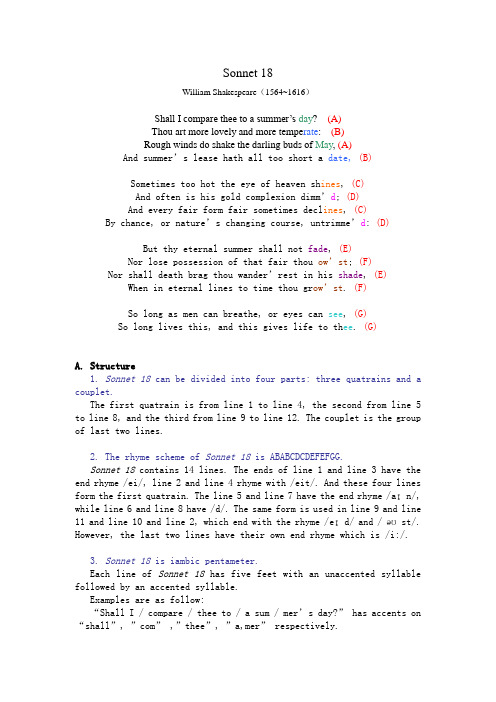
Sonnet 18William Shakespeare(1564~1616)Shall I compare thee to a summer’s day? (A)Thou art more lovely and more tempe rate: (B)Rough winds do shake the darling buds of May, (A)And summer’s lease hath all too short a date, (B)Sometimes too hot the eye of heaven sh ines, (C)And often is his gold complexion dimm’d; (D)And every fair form fair sometimes decl ines, (C)By chance, or nat ure’s changing course, untrimme’d: (D)But thy eternal summer shall not fade, (E)Nor lose possession of that fair thou ow’st; (F) Nor shall death brag thou wander’rest in his shade, (E)When in eternal lines to time thou gr ow’st. (F)So long as men can breathe, or eyes can see, (G)So long lives this, and this gives life to th ee. (G)A. Structure1. Sonnet 18 can be divided into four parts: three quatrains and a couplet.The first quatrain is from line 1 to line 4, the second from line 5 to line 8, and the third from line 9 to line 12. The couplet is the group of last two lines.2. The rhyme scheme of Sonnet 18 is ABABCDCDEFEFGG.Sonnet 18 contains 14 lines. The ends of line 1 and line 3 have the end rhyme /ei/, line 2 and line 4 rhyme with /eit/. And these four lines form the first quatrain. The line 5 and line 7 have the end rhyme /aɪn/, while line 6 and line 8 have /d/.The same form is used in line 9 and line 11 and line 10 and line 2, which end with the rhyme /eɪd/ and /əʊst/. However, the last two lines have their own end rhyme which is /i:/.3. Sonnet 18 is iambic pentameter.Each line of Sonnet 18 has five feet with an unaccented syllable followed by an accented syllable.Examples are as follow:“Shall I / compare / thee to / a sum / mer’s day?” has accents on “shall”, ”com” ,”thee”, ”a,mer” respectively.“Thou art / more love / ly and / more tem / perate:” has accents on “thou”, “more”, “ly”, “more”, “pe” respectively.B. Language use1. Several kinds of rhetoric are used.Metaphor: “T he eye of heaven” means the sun.Simile: “Shall I compare thee to a summer’s day?” uses simile to compare the loved to a summer’s day.Personification: “his gold complexion”personates the summer’s day and “shake the darling buds” uses “shake” to personate the rough winds.Inversion: “And every f air form fair sometimes declines” can be in the order like this: “And every fair sometime declines from fair”.“By chance, or nat ure’s changing course, untr imme’d” can be in the order like this: “untrimmed by chance or nature's changing course”.2. Old English useThee: “you” as objectThou: “you” as subjectArt: areHath: hasThy: “your” followed by a consonant3. Images“A summer's day” means the season of summer.“Day” means a period of time.“Lease” means allotted time.“The eye of heaven” means sun.“His its” means sun.“Fair” means something beautiful.“This” means this poem.C. Appreciation1. Shakespeare compares his friend to a summer’s day. From line 1 to line 8, then he pays attention to praise his friend’s permanence, while from line 9 to line 14, and his focus is shifted towards expressing that poetry is immortal.2. Sonnet 18’s first line asks a question: how can I compare you toa summer’s day?Line 2 answers the question that the loved one is more gentle and lovely.From line 4 to line 8, poet says summer is too short. And sometimes it will shine too much and can be burning while sometimes it will bedimmed when cloudy or overcast. All the beautiful things will finally lose their perfection for nature’s change and instability.From line 9 to line 14, poet starts praising an eternal beauty. This beauty is the beloved one and also the poems, and it is the poems make the loved everlasting.3. The theme of Sonnet 18is that love is the only thing that can conquer all the things in the world and the beauty is the immortal thing that can never be replaced.。
sonnet18的英文赏析(部分)
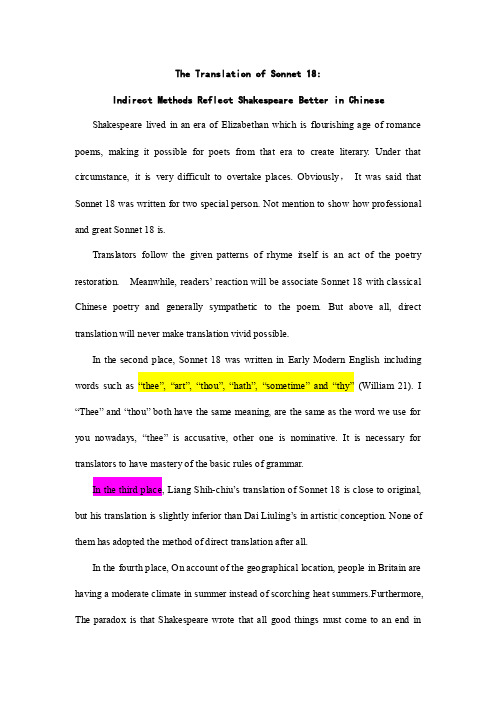
The Translation of Sonnet 18:Indirect Methods Reflect Shakespeare Better in Chinese Shakespeare lived in an era of Elizabethan which is flourishing age of romance poems, making it possible for poets from that era to create literary. Under that circumstance, it is very difficult to overtake places. Obviously,It was said that Sonnet 18 was written for two special person. Not mention to show how professional and great Sonnet 18 is.Translators follow the given patterns of rhyme itself is an act of the poetry restoration. Meanwhile, readers’ reaction will be associate Sonnet 18 with classical Chinese poetry and generally sympathetic to the poem. But above all, direct translation will never make translation vivid possible.In the second place, Sonnet 18 was written in Early Modern English including words such as “thee”, “art”, “thou”, “hath”, “sometime” and “thy”(William 21). I “Thee” and “thou” both have the same meaning, are the same as the word we use for you nowadays, “thee” is accusative, other one is nominative. It is necessary for translators to have mastery of the basic rules of grammar.In the third place, Liang Shih-chiu’s translation of Sonnet 18is close to original, but his translation is slightly inferior than Dai Liuling’s in artistic conception. None of them has adopted the method of direct translation after all.In the fourth place, On account of the geographical location, people in Britain are having a moderate climate in summer instead of scorching heat summers.Furthermore, The paradox is that Shakespeare wrote that all good things must come to an end inline 7, line 8 is actually doing matting to the next lines,.In the eyes of Shakespeare, there is no doubt that “thou” will s pread through the ages just like what he wrote in his las t two lines are expressed by “men can breathe”, “eyes can see” (William 21).In the fifth place, Sonnet 18 is not perfect despite its classic, indirect translation is a vital part during propagation. Most of the college student s don’t appreciate Sonnet 18 based on teaching investigation. It is normal that classical poetry are n’t popular, but it is vain to ascribe this phenomenon to readers or the society. Few people can look again for the classical poetry. However, flaws in text itself maybe the reason why they are unpopular. On the one hand, although Sonnet 18 consists of three quatrains and a couplet, the rhyme isn’t neat. The stress placement of the end rhyme are difference, despite “temperate” in line 2 and “date” in line 4 are end with “ate”. Compared with the other lines, this rhyme is abrupt. The two “ands” in the beginning of line 6 and line 7 should function as a progressive alliteration rather than a parallel one. Meter, rhyme and stanza, in the right hands, can be inescapably precise as to tone, rhythm, emphasis and the stages of the argument. Shakespeare was overdoing it in Sonnet 18, it’s disrupted the form of Sonnet 18 and fragmented the melody and rhythm. All these factors had negative impact on Sonnet 18. Actually, the readers foun d that difficult to read bumpy sentences. On the other hand, “And every fair from fair sometime declines”(William 21) was written in obscure way that readers may feel abstract. “Summer” has a lease but the lease is short, from “And summer’s lease hath all too short a date” (William 21) in line 4. The sheer aesthetics that Shakespeare goes for in some ways readers may feel strange. There were anthropomorphic, forexample, “death” doesn’t exist, not to mention that it could brag, but this descriptive method is commonplace for such a classical poem. It is a truth acknowledged by anyone that life is short and time is swift, simple truth are told in the presentation of complex information, readers may not feel cordiality and geniality. Indirect translation can put original version into a band new one, to avoid this situation and make the work get better and better, especially be particularly important for readers under this circumstances. Direct translation will never make that happen and only make matters worse.When I learnt an ancient poem as a pupil, I wasn’t learning at the right level, I just learnt the words, not the message, then I asked my teacher for help. My teacher Would told me about the profound intent. When I read a poem, especially the translatio n, it’s not just about the literal meaning, I want to know the inner meaning of it, including its cultural background, historical origin and so on. After reading, I must learn some new knowledge, that’s the meaning of reading. Indirect translation is like my teacher, making my read smoothly and understandingly.Sonnet 18 is one of the most beautiful sonnets written by Shakespeare. In this sonnet, the poet writes beautifully on the conventional theme that his poetry will bring eternity to the one he loves a nd eulogizes. However, it’s more than that.Conceptual Blending Theory is used in this paper to analyze why literal translation and liberal translation arise in translation. It points out that, when translating the rhetorical devices in English titles, both translational equivalence and functional equivalence can be taken as the criteria.。
sonnet 18—by William Shakespeare赏析

sonnet 18—by William Shakespeare赏析09级汉语言文学郑响英200921010128Shall I compare thee to a summer’s day?Thou art more lovely and more temperate:Rough winds do shake the darling buds of May,And summer’s lease hath all too short a date:Sometime too hot the eye of heaven shines,And often is his gold complexion dimmed;And every fair from fair sometime declines,By chance or nature’s changing course untrimmedBut thy eternal summer shall not fadeNor lose possession of that fair thou owest;Nor shall Death brag thou wanderest in his shade,When in eternal lines to time thou growest:So long as men can breathe,or eyes can see,So long lives,this and this gives life to thee.鲁迅《花边文学》中这样写到——严复提起过“狭斯丕尔”,一提便完;梁启超说过“莎士比亚”,也不见有人注意;田汉译了这人的一点作品,现在似乎不大流行了。
到今年,可又有些“莎士比亚”“莎士比亚”起来。
雨果也曾经这样评价到——迎着耻辱和嘲讽,莎士比亚跃出,头带风暴,冲破云层,幽晦的诗人写了一部作品,那样艰涩,那样壮丽、恢宏,光彩夺目,满是深渊,眩晕,光焰射向山顶,在未闻的幽境,那么阴沉、丰富,三百年来,思想家迷蒙,凝视他,惊愕,那是一切的归宿,那是人类心灵深处的一座山峰。
十四行诗18英文赏析-莎士比亚[整理版]
![十四行诗18英文赏析-莎士比亚[整理版]](https://img.taocdn.com/s3/m/faf35c37bdd126fff705cc1755270722192e59c0.png)
莎士比亚的第18首十四行诗的英文赏析我能否将你比作夏天?你比夏天更美丽温婉。
狂风将五月的蓓蕾凋残,夏日的勾留何其短暂。
休恋那丽日当空,转眼会云雾迷蒙。
休叹那百花飘零,催折于无常的天命。
唯有你永恒的夏日常新,你的美貌亦毫发无损。
死神也无缘将你幽禁,你在我永恒的诗中长存。
只要世间尚有人吟诵我的诗篇,这诗就将不朽,永葆你的芳颜。
这首诗的艺术特点首先是在于它有着双重主题:一是赞美诗人爱友的美貌,二是歌颂了诗歌艺术的不朽力量。
其次就是诗人在诗中运用了新颖的比喻,但又自然而生动。
Sonnet 18, often alternately titled Shall I compare thee to a summer's day?, is one of the best-known of 154 sonnets written by the English playwright and poet William Shakespeare. Part of the Fair Y outh sequence (which comprises sonnets 1-126 in the accepted numbering stemming from the first edition in 1609), it is the first of the cycle after the opening sequence now described as the Procreation sonnets. Most scholars now agree that the original subject of the poem, the beloved to whom the poet is writing, is a male, though the poem is commonly used to describe a woman.In the sonnet, the poet compares his beloved to the summer season, and argues that his beloved is better. The poet also states that his beloved will live on forever through the words of the poem. Scholars have found parallels within the poem to Ovid's Tristia and Amores, both of which have love themes. Sonnet 18 is written in the typical Shakespearean sonnet form, having 14 lines of iambic pentameter ending in a rhymed couplet. Detailed exegeses have revealed several double meanings within the poem, giving it a greater depth of interpretation.Sonnet 18 is a typical English or Shakespearean sonnet. It consists of three quatrains followed by a couplet, and has the characteristic rhyme scheme: abab cdcd efef gg. The poem carries the meaning of an Italian or Petrarchan Sonnet. Petrarchan sonnets typically discussed the love and beauty of a beloved, often an unattainable love, but not always.[5] It also contains a volta, or shift in the poem's subject matter, beginning with the third quatrain.A facsimile of the original printing of Sonnet 18.The poem starts with a line of adoration to the beloved—"Shall I compare thee to a summer's day?" The speaker then goes on to say that the beloved being described is both "more lovely and more temperate" than a summer's day. Thespeaker lists some things that are negative about summer. It is too short—"summer's lease hath all too short a date"—and sometimes the sun shines too hot—"Sometime too hot the eye of heaven shines." However, the beloved being described has beauty that will last forever, unlike the fleeting beauty of a summer's day. By putting his love's beauty into the form of poetry, the poet is preserving it forever by the power of his written words. "So long as men can breathe, or eyes can see, So long lives this, and this gives life to thee." The hope is that the two lovers can live on, if not through children, then through the poems brought forth by their love which, unlike children, will not fadeA major feature of this poem - analogy. Begins with the first sentence, put "you" and "Summer" as a analogy, compare the second line of the initial determination: Are you more lovely than the summer, more gentle. The difference is due to produce its in-depth analysis of 3 to 14 lines. Specifically, the first line of 3.4.5.6.7.8 enumerated the "summer" all kinds of regrets, and 9.10.11.12.13.14 line tells the "you" all kinds of advantages compared to the natural draw a final conclusion: "Y ou" is far better than "Summer," "you" because in his poetry between the lines but also has a life, and time forever. Also noteworthy is the verse 13 and 14 are also, by analogy emphasized the "eternal nature."Throughout the poem, the poet freely to the "you" talk, it seems that "you" is a living person, to listen to his voice, understanding his thinking. So this poem can be said to be people in the application of techniques based on the written. The poem "Y ou" refers to an object, academia, there are two explanations, one view is that it refers to beauty, and the other that it refers to poetry to express the good things. Now most scholars prefer the latter.One of the best known of Shakespeare’s sonnets, Sonnet 18 is memorable for the skillful and varied presentation of subject matter, in which the poet’s feelings reach a level of rapture unseen in the previous sonnets. The poet here abandons his quest for the youth to have a child, and instead glories in the youth’s beauty.On the surface, the poem is simply a statement of praise about the beauty of the beloved; summer tends to unpleasant extremes of windiness and heat, but the beloved is always mild and temperate. Summer is incidentally personified as the "eye of heaven" with its "gold complexion"; the imagery throughout is simple and unaffected, with the "darling buds of May" giving way to the "eternal summer", which the speaker promises the beloved. The language, too, is comparatively unadorned for the sonnets; it is not heavy with alliteration or assonance, and nearly every line is its own self-contained clause--almost every line ends with some punctuation, which effects a pause.Initially, the poet poses a question―”Shall I compare thee to a summer’s day?”―and then reflects on it, remarking that the youth’s beauty far surpasses summer’s delights. The imagery is the very essence of simplic ity: “wind”and “buds.”In the fourth line, legal terminology―”summer’s lease”―is introduced in contrast to the commonplace images in the first three lines. Note also the poet’s use of extremes in the phrases “more lovely,”“all too short,”and “too hot”; these phrases emphasize the young man’s beauty.Although lines 9 through 12 are marked by a more expansive tone and deeper feeling, the poetreturns to the simplicity of the opening images. As one expects in Shakespeare’s sonnets, the proposition that the poet sets up in the first eight lines―that all nature is subject to imperfection―is now contrasted in these next four lines beginning with “But.”Although beauty naturally declines at some point―”And every fair from fair sometime declines”―the youth’s beauty will not; his unchanging appearance is atypical of nature’s steady progression. Even death is impotent against the youth’s beauty. Note the ambiguity in the phrase “eternal lines”: Are these “lines”the poet’s verses or the youth’s hoped-for children? Or are they simply wrinkles meant to represent the process of aging? Whatever the answer, the poet is jubilant in this sonnet because nothing threatens the young man’s beautiful appearance.Sonnet 18 is the first poem in the sonnets not to explicitly encourage the young man to have children. The "procreation" sequence of the first 17 sonnets ended with the speaker's realization that the young man might not need children to preserve his beauty; he could also live, the speaker writes at the end of Sonnet 17, "in my rhyme." Sonnet 18, then, is the first "rhyme"--the speaker's first attempt to preserve the young man's beauty for all time. An important theme of the sonnet (as it is an important theme throughout much of the sequence) is the power of the speaker's poem to defy time and last forever, carrying the beauty of the beloved down to future generations. The beloved's "eternal summer" shall not fade precisely because it is embodied in the sonnet: "So long as men can breathe or eyes can see," the speaker writes in the couplet, "So long lives this, and this gives life to thee."大多数莎学家认为,是作者赞美好友的超常之美的。
sonnet18英文赏析
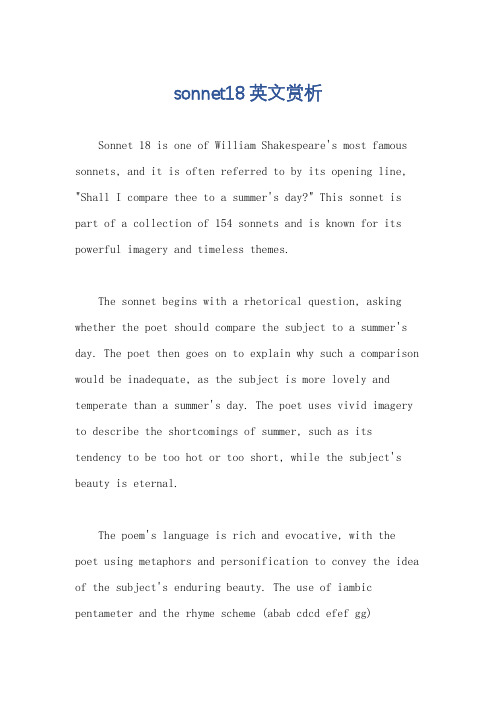
sonnet18英文赏析Sonnet 18 is one of William Shakespeare's most famous sonnets, and it is often referred to by its opening line, "Shall I compare thee to a summer's day?" This sonnet is part of a collection of 154 sonnets and is known for its powerful imagery and timeless themes.The sonnet begins with a rhetorical question, asking whether the poet should compare the subject to a summer's day. The poet then goes on to explain why such a comparison would be inadequate, as the subject is more lovely and temperate than a summer's day. The poet uses vivid imagery to describe the shortcomings of summer, such as its tendency to be too hot or too short, while the subject's beauty is eternal.The poem's language is rich and evocative, with the poet using metaphors and personification to convey the idea of the subject's enduring beauty. The use of iambic pentameter and the rhyme scheme (abab cdcd efef gg)contribute to the poem's musicality and elegance.Overall, Sonnet 18 is a celebration of the subject's beauty and an exploration of the nature of true beauty. It has captivated readers for centuries with its timeless themes of love, beauty, and the passage of time.。
- 1、下载文档前请自行甄别文档内容的完整性,平台不提供额外的编辑、内容补充、找答案等附加服务。
- 2、"仅部分预览"的文档,不可在线预览部分如存在完整性等问题,可反馈申请退款(可完整预览的文档不适用该条件!)。
- 3、如文档侵犯您的权益,请联系客服反馈,我们会尽快为您处理(人工客服工作时间:9:00-18:30)。
Sonnet 18
By William Shakespeare
Shall I compare thee to a summer’s day?
Thou art more lovely and more temperate: Rough winds do shake the darling buds of May, And summer’s lease hath all too short a date: Sometimes too hot the eye of heaven shines
And often is his gold complexion dimed;
And every fair form fair sometimes declines,
By chance or nature’s changing course untrimmed; But thy eternal summer shall not fade,
Nor lose possession of that fair thou ow’st;
Nor shall death brag thou wander’st in his shade. When in eternal lines to time thou grow’st:
So long as men can breathe,or eyes can see,
So long lives this,and this gives life to thee.
十四行诗(其十八)
威廉·莎士比亚
我能把你比作夏日吗?
尽管你更可爱、更温和;
夏日的狂风可能会摧残五月的花儿,
季节的限制又减少了可拥有的日光;
天空的巨眼有时过于灼热,
常使自身的辉煌无故湮没;
每一种美都会消逝,
不管愿意或是无奈;
然而你这盛夏将永存不朽,
连你所有的美都不会褪去;
死神不忍逼近,
生命只会长存;
只要人类能呼吸,能看见;
我的诗就会存在,而你的生命也会延续。
Sonnet 18 is absolutely one of the most famous sonnets of Shakespeare. Almost every English learner can recite some lines of it either for appreciation or pleasure as both the thematic feature and artistic feature shine brightly and attractively. In the following, I will illustrate my understanding of this sonnet in these two aspects.
Firstly, something about the sonnet’s thematic feature.
The first two lines, in the form of a question and an assertive肯定statement, show the poet’s idea of comparing his beloved with a summer’s day and also point out that the beloved person is more beautiful and less extreme than summer. It is understandable that summer is chosen as the comparison target because it is lovely and pleasant. While the next
six lines describe the less pleasant aspects of summer: the too strong wind, the extreme hot weather as well as the easy disappearance of all beauties. The ninth line takes up the comparison with summer again: summer has by now become the summer of life. The comparison turns into a contrast by referring back to the seventh. The poet's assurance becomes even firmer in lines eleven and twelve, which contain a promise that death will be conquered that the beloved one’s spirit and life will surely be eternal. The last two lines further emphasize the poet’s belief that the eternity of spirit and virtue of his beloved by pointing out the poem’s eternal function and existence.
With this arrangement of structure and content, the poet gives this sonnet two thematic meanings.The primary meaning is simply a statement to praise the beauty of the beloved one. But the more important and deep one is the poet’s thought that the power of the poem which can defy不屈服time and last forever.Its double themes are one distinguishing feature of the sonnet.
Secondly, the analysis of this sonnet’s artistic feature.
It contains 14 lines. We can easily observe that the ends of line 1 and line 3 have the end rhyme: /ei/, line 2 and line 4 rhyme with /eit/. And these four lines form a quatrain. The same form is used in the second quatrain from line 5 to line 8,the third quatrain from line 9 to line 12. However,the last two lines have their own form, as they have the end
rhyme:/i:/Each line in this sonnet is in iambic pentameter which means each line has five feet, usually an unaccented syllable followed by an accented syllable. For example, we can divide the first line into five independent feet as “Shall I / compare / thee to/ a sum / mer’s day?”With accents on shall,com,thee,a,mer respectively.
Some figures of speech are also in use like simile明喻and personification拟人. We can see the sun is regarded as “the eye of heaven” which is a simile. We can find the word “his” used to describe the sun and the death which gives them life as the illustration of the use of personification. This makes the images the poet points out linked to each other and vividly form the whole imagery.
To make a general conclusion of its stylistic feature, this sonnet is a typical Shakespearian sonnet with fourteen lines in iambic pentameter, including three quatrains and one couplet with the rhyme scheme ababcdcdefefgg. Besides this, sonnet 18 is in use of alliteration and figures of speech which add more beauty to the tonality 音调of the poem.。
